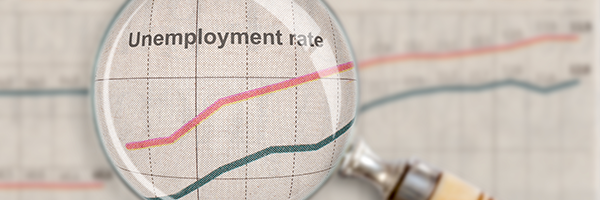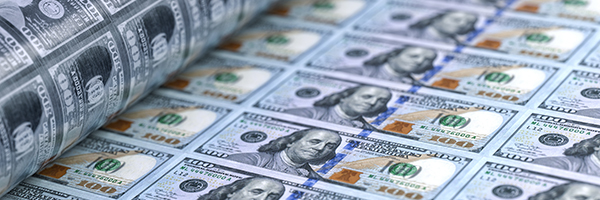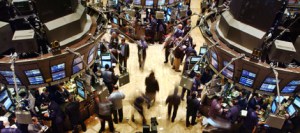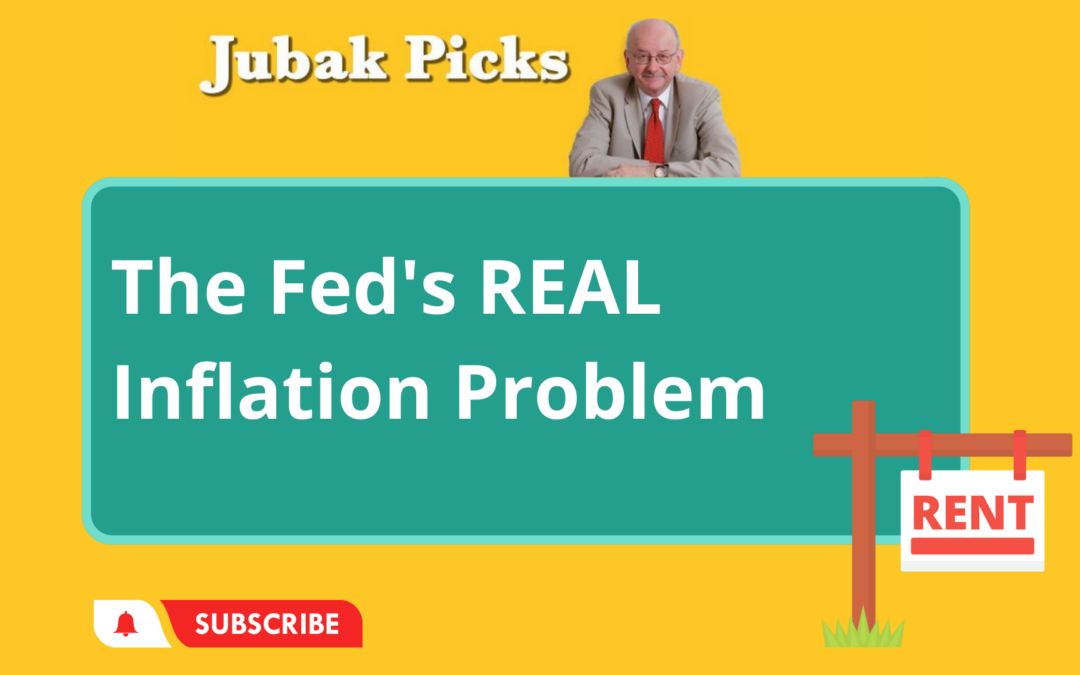
October 7, 2022 | Daily JAM, Morning Briefing |
The U.S. economy added 263,000 jobs in September (after seasonal adjustments), the Labor Department reported this morning. The total was down from 315,000 in August but it was enough to bring the unemployment rate down to 3.5% from 3.7% in August. This good news for workers and families, is, of course, bad news for the financial markets, which keep looking for signs that the economy is slowing enough to slow the Federal Reserve’s aggressive round of interest rate increases.

October 6, 2022 | Daily JAM |
The U.S. dollar was up hard today, October 6. The Invesco DB U.S. Dollar Bullish Fund ETF (UUP) rose 1.00%. The Dollar Spot Index (DXY) gained 0.90% And Treasury yields resumed the upward move that has erased much of the gain in bond prices of the last week.

October 4, 2022 | Daily JAM, Videos |
My one-hundred-and-ninety-first YouTube video: “Trend of the Week Housing Prices Fall, Finally” went up today This week’s Trend of the Week is “Housing Prices Fall, Finally.” We’ve recently seen a big increase in mortgage rates, but the housing market hadn’t really slowed, until July. According to the S&P CoreLogic Case-Shiller Home Price Index, the year-over-year housing prices went up 18.1% in June of this year, and 15.8% in July. While it’s still a big increase over last year, there is a noticeable deceleration. Month-to-month housing prices in the 20 cities in the Case-Shiller Index fell 0.4% in July, marking the first drop in month-to-month housing prices since 2012. If you look at Lennar Corporation (LEN), a good representation of the housing and building market, you can see the decline in mid-August where investors started to truly believe home and building prices are indeed going to fall. Watch the housing sector. It’s the first place where the Fed’s interest rate increase is having a tangible effect. We’ll continue to see housing prices fall as mortgage rates go up. And it’s an early sign that the Fed’s tightening is working to slow the economy.

October 1, 2022 | Daily JAM, Special Reports |
Today, October 1, I’ve gone back through this Special Report to update any parts of my calendar in light of what we’ve learned about the economy, about Federal Reserve interest rate policy, and about the global economy in the last few weeks. This update includes my take on the August jobs report and the September 21 meeting of the Fed. (It’s a complete revision of the original so changes are in the body of the original text.) It is different this time. And it’s likely to “be different this time” for the next five years or so. And you need an investment strategy for that period.

September 30, 2022 | Daily JAM, Morning Briefing |
The Personal Consumption Expenditures index, the Federal Reserve’s preferred inflation measure, rose in August. The index climbed 0.3% from July. Year over year the PCE is up 6.2%. Excluding food and energy, the core PC index rose 0.6% in August from July and at a 4.9% year-over-year rate.
Both the headline and core numbers showed a month-to-month acceleration in inflation. That’s bad news for the Federal Reserve, investors, and consumers since it indicates that inflation is stickier than hoped and that it will take the Fed longer to bring inflation down to its 2% target. This ratchets up the importance of the Consumer Price Index for September with that inflation number due on Thursday, October 13.

September 25, 2022 | Daily JAM |
Every bond market analyst worth his or her salt is watching for signs of liquidity problems and a ramp-up in volatility in the bond market
Financial markets don’t like falling share prices, but Bear Markets are familiar territory. We’ve seen them before. We know they end. We know, battered ad tattered certainly, we’ll survive. But a liquidity crisis is something different. No one knows how big the damage might be or who will get crushed and who will skate through. And as the subprime mortgage crisis, which became the Global Financial Crisis and then the Global Economic crisis, demonstrates, those effects can be stunningly widespread.

September 22, 2022 | Daily JAM, Morning Briefing |
One of the oddest things about yesterday’s reaction to news from the Federal Reserve of a 75 basis point increase in interest rates was that the market initially rallied. Yesterday, September 21, from 3801 at 10:25 a.m.New York time, the Standard & Poor’s 500 moved up to 3895 at 2:40 p.m. right after the Fed released its news. And, then, markets began a retreat with the S&P 500 closing down 1.71% on the day. It’s almost like the markets constructed one story–relatively positive–in the immediate aftermath of the news. And, then, upon further consideration, built a different much less positive story to the close of the day. Make that “exactly” instead of “almost like.”

September 21, 2022 | Daily JAM |
At today’s meeting of the Federal Open Market Committee, the U.S. central bank raised interest rates by 75 basis points for a third straight meeting. That took the Fed’s short-term benchmark rate to a range of 3% to 3.25%. This move was widely expected with the CME FedWatch Tool giving odds of 84% yesterday on a 75 basis point increase. What the market hadn’t expected was how negative the Fed’s projections in its Dot Plot would be. To sum up: Higher interest rates (with more rate increases) for longer. And very low economic growth but no recession.

September 20, 2022 | Daily JAM, Morning Briefing |
You’d think that if everyone (maybe even Samuel Beckett) is expecting the Fed to raise interest rates 75 basis points at tomorrow’s meeting of the Open Market Committee, financial markets would have been able to move on today to other “issues.” (Like Ford’s huge negative earnings pre-announcement or the global supply crunch for coffee. The CME FedWatch Tool today puts the odds of a 75 basis point increase at 84%. The other 16% goes to a 100 basis point increase. Nobody is expecting just 50 tomorrow. But no. Stocks and bonds are lower but it feels like markets are just marking time.

September 14, 2022 | Daily JAM, Videos |
My one-hundred-and-seventy-fifth YouTube video: “The Fed’s Real Inflation Problem” went up today. The CPI numbers came out and they were disappointing with Inflation running at an 8.3% annual rate in August. But the inflation problem is worst than the headline numbers indicate. Shelter, the single biggest component of the CPI inflation rate, was up by the most in August since 1991. And the Federal Reserve has very little ability to lower a runaway inflation rate in rents using its usual methods of raising interest rates and curbing growth in the money supply. That means the process of controlling inflation is going to be slow and difficult.

September 14, 2022 | Daily JAM, Morning Briefing |
Investors and traders have decided not to panic today. Which certainly wasn’t the case yesterday. I’ll leave it to you to decide if a 5.54% drop in the NASDAQ 100 is a measured reaction to inflation running 20 basis points hotter than projected. (Amazon (AMZN) fell 3.06%, Apple (AAPL) was down 5.87%, Applied Materials (AMAT) was lower by 6.14%, and Nvidia (NVDA) plunged 9.47%.) But I sure caught a whiff of panic in Wall Street calls for the Federal Reserve to raise interest rates by a full 1.00%–and not the widely anticipated–0.75% at the September 21 meeting of the Open Market Committee.

September 13, 2022 | Daily JAM, Morning Briefing |
Stocks plunged today as the Consumer Price Index inflation measure came in above economist expectations and market hopes.
Headline CPI inflation ran at an 8.3% annual rate in August. That was down from the 8.5% annual rate in July and the 9.1% annual rate in June. But above the 8.1% annual rate forecast by economists.
On the news, stocks fell steeply with the Standard & Poor’s 500 down 4.32% for the day and the Dow Jones Industrial Average off 3.94%. The NASDA Composite fell 5.16% and the NASDAQ 100 plummeted y 5.54%. The small-cap Russell 2000 was down 3.91%. I think that within a few days the reaction is likely to strike investors as excessive. The trend in inflation did still point down and it increasingly looks like June’s 9.1% in the peak. And while the hotter-than-expected inflation rate did just about guarantee that the Federal Reserve will raise interest rates by 75 basis when it meets on Wednesday, September 21, most of Wall Street had already concluded that a 75 basis-point move was locked in. So what’s the hubbub, Bub?














